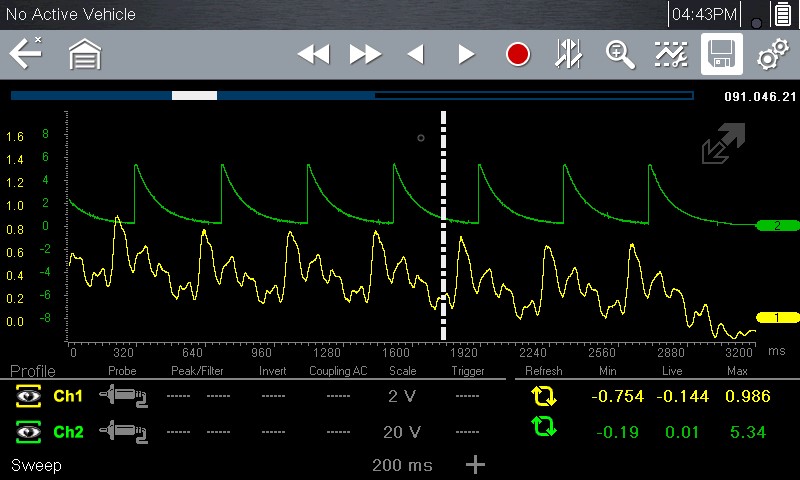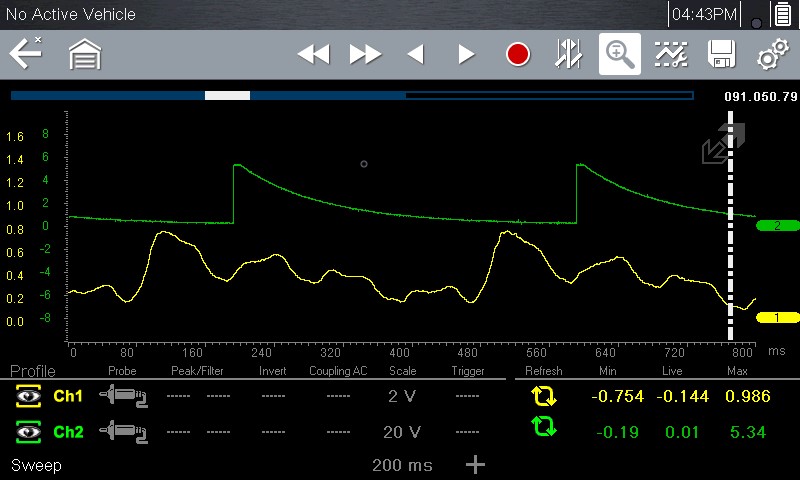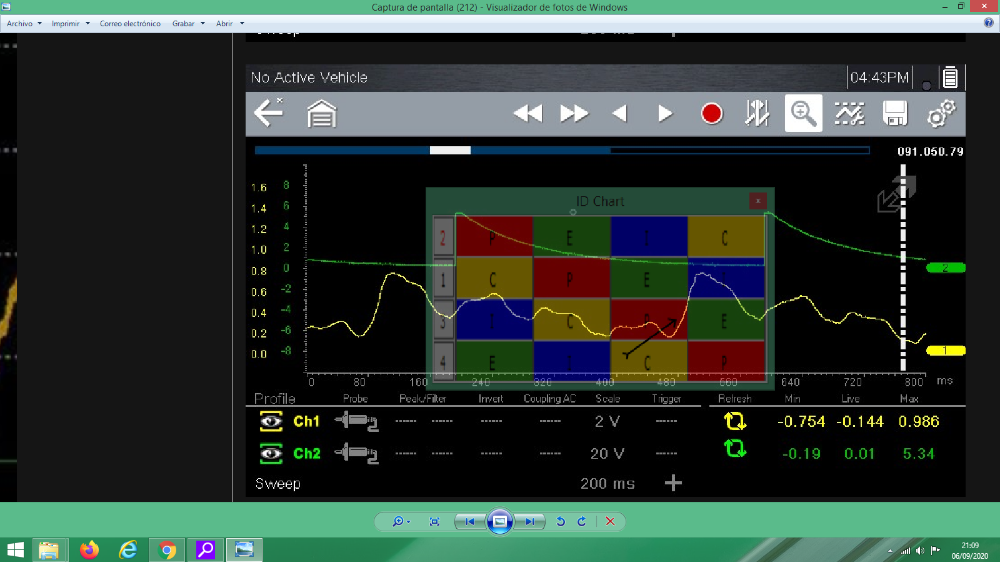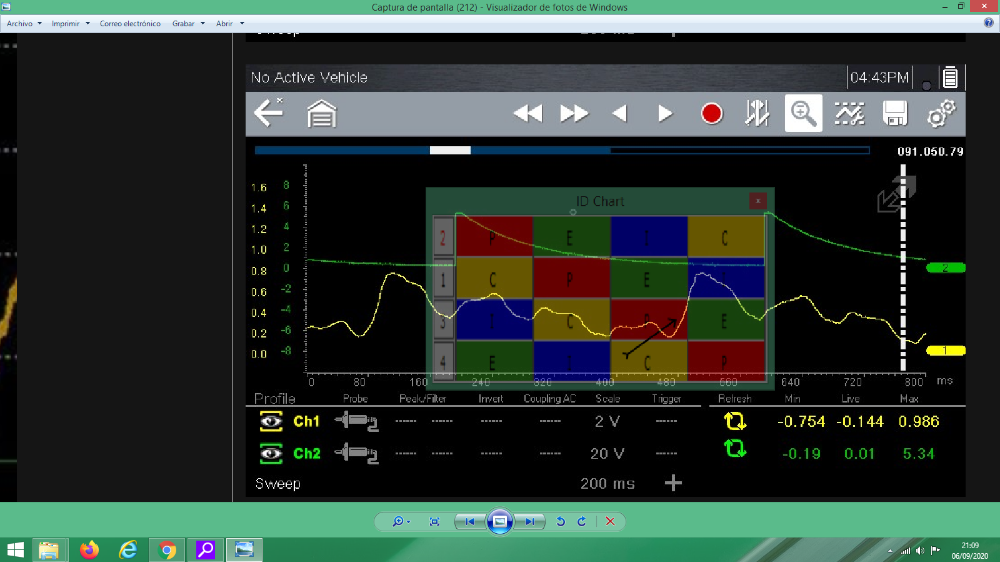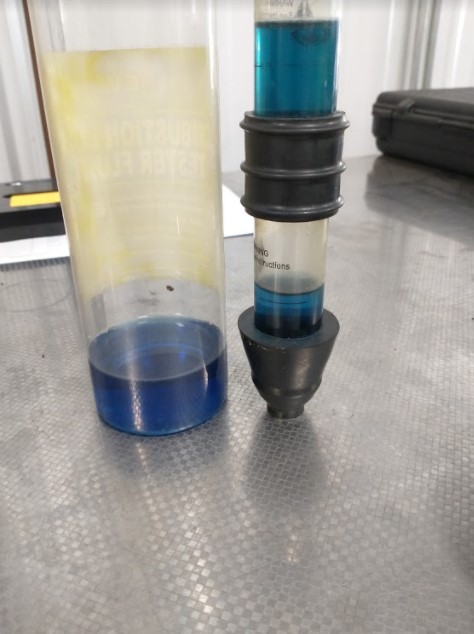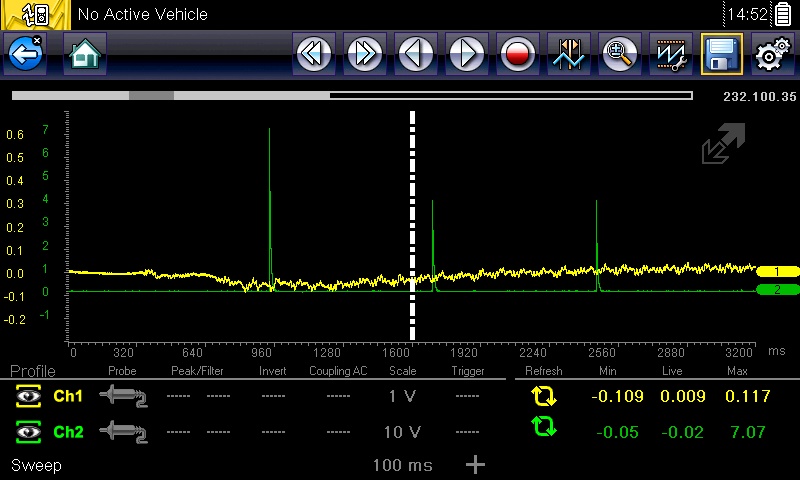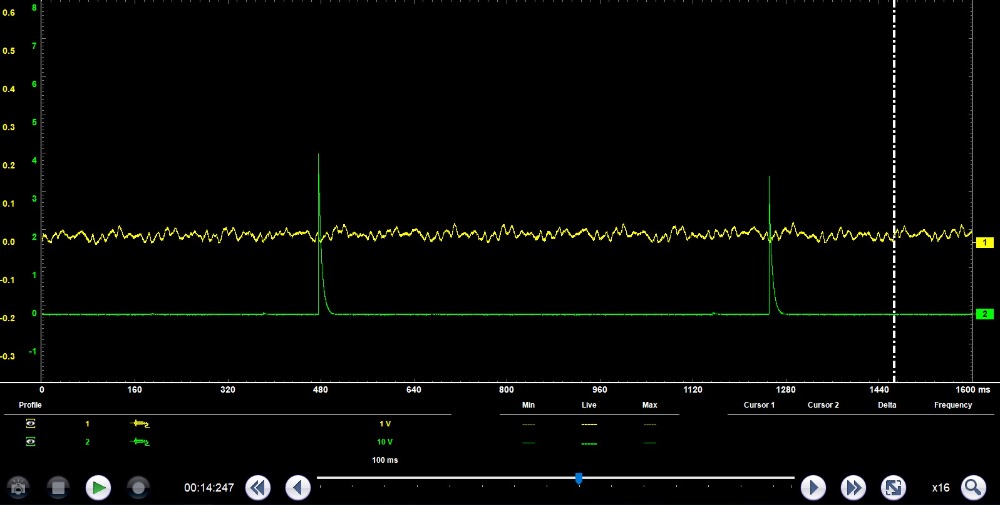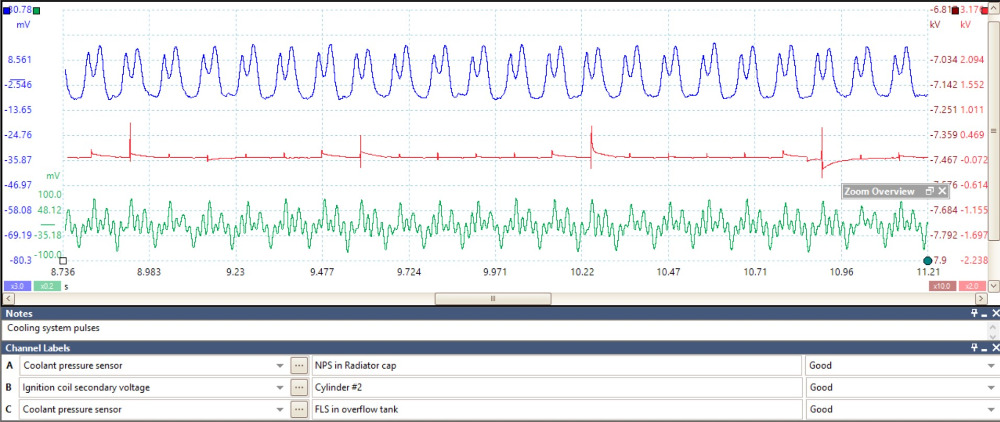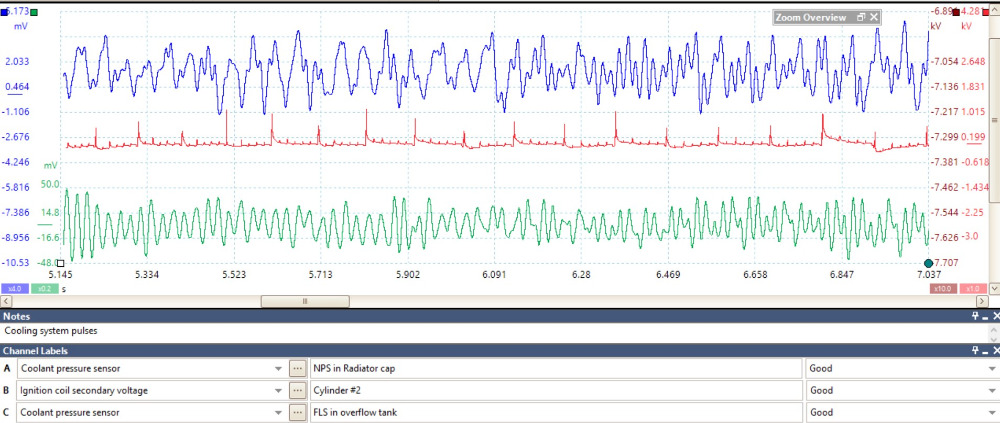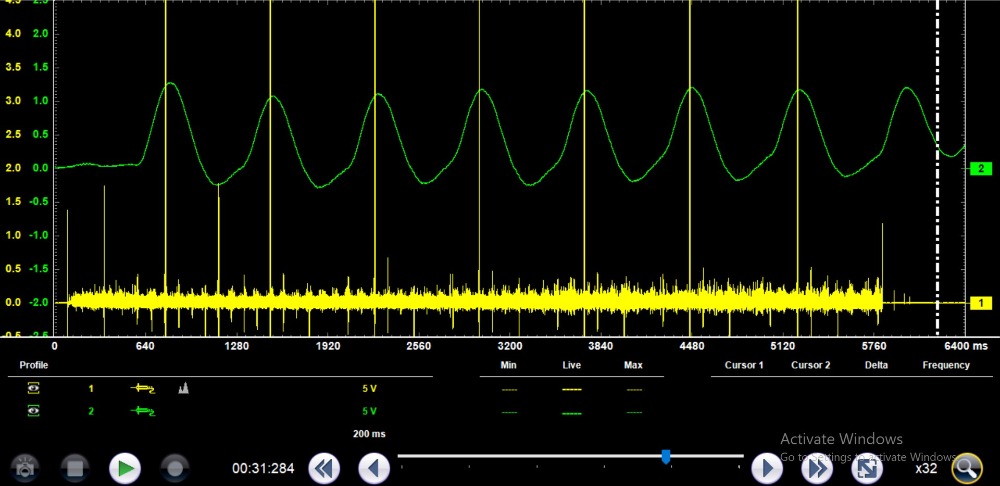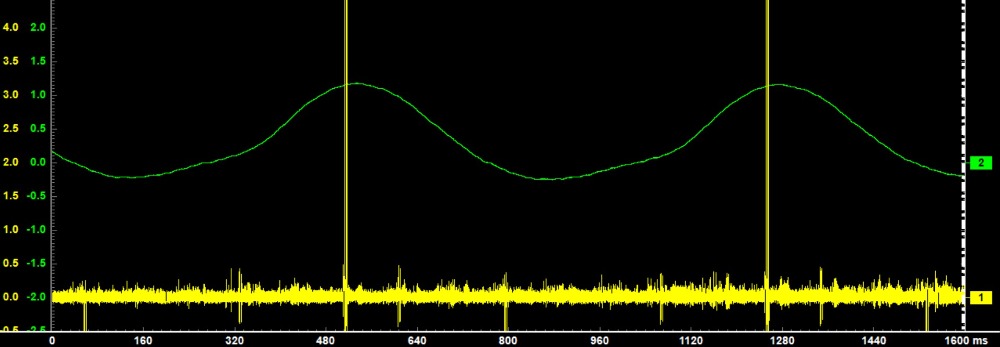Re:Which cylinder is blown?
- Posts: 5835
- Thank you received: 1420
Cody's pulse sensor installed in the radiator on the yellow trace. Ignition coil #1 control in green.
It's pre-Labor Day weekend. It's hot, you're tired, and out of f***s to give. You can pull one spark plug to (hopefully) see coolant in the cylinder and 150% prove the blown head gasket.
WHICH ONE DO YOU PULL?
Please Log in or Create an account to join the conversation.
Please Log in or Create an account to join the conversation.
- Posts: 5835
- Thank you received: 1420
Please Log in or Create an account to join the conversation.
"Knowledge is a weapon. Arm yourself, well, before going to do battle."
"Understanding a question is half an answer."
I have learned more by being wrong, than I have by being right.
Please Log in or Create an account to join the conversation.
- juergen.scholl
-

- Offline
- Platinum Member
-

- Active partschanger
- Posts: 1197
- Thank you received: 446
An expert is someone who knows each time more on each time less, until he finally knows absolutely everything about absolutely nothing.
Please Log in or Create an account to join the conversation.
juergen.scholl wrote: I'd pull #4 as the pressure rise coincides with this cylinder's last 30 to 40 degrees of the compression stroke.
You have clylinder #2 as the sync cylinder.
Tyler is synced on Cylinder #1.
"Knowledge is a weapon. Arm yourself, well, before going to do battle."
"Understanding a question is half an answer."
I have learned more by being wrong, than I have by being right.
Please Log in or Create an account to join the conversation.
- juergen.scholl
-

- Offline
- Platinum Member
-

- Active partschanger
- Posts: 1197
- Thank you received: 446
Chad wrote:
juergen.scholl wrote: I'd pull #4 as the pressure rise coincides with this cylinder's last 30 to 40 degrees of the compression stroke.
You have clylinder #2 as the sync cylinder.
Tyler is synced on Cylinder #1.
I misread the sync. With the sync on #1 as in your picture cylinder#2 is the faulty one.
An expert is someone who knows each time more on each time less, until he finally knows absolutely everything about absolutely nothing.
Please Log in or Create an account to join the conversation.
- Posts: 5835
- Thank you received: 1420
To be honest, I actually pulled #4 first. :blush: It's been my experience that, when using the pulse sensor on cooling systems, there's usually a significant delay between the problem cylinder going to TDC compression, and the pulse showing up at the sensor. But this one seemed to be pretty direct! :silly: Smaller cooling system, maybe.
"But Tyler, why didn't you just use the head gasket tester and stick a fork in it from the beginning?" Well, I did:
Please Log in or Create an account to join the conversation.
- Posts: 4425
- Thank you received: 961
Do you find the pressure pulse on the rad to be a worthwhile test?
I mean, is there not pressure pulses taking place in the cooling system as the pump moves coolant through the system?
I'm not being a naysayer, just trying to understand the variables.
"Ground cannot be checked with a 10mm socket"
Please Log in or Create an account to join the conversation.
- juergen.scholl
-

- Offline
- Platinum Member
-

- Active partschanger
- Posts: 1197
- Thank you received: 446
Noah wrote: I try explaining to the boss that when it comes to the chemical test, fail is fail. Pass is just inconclusive.
Do you find the pressure pulse on the rad to be a worthwhile test?
I mean, is there not pressure pulses taking place in the cooling system as the pump moves coolant through the system?
I'm not being a naysayer, just trying to understand the variables.
My observation is yes, there are pulsations present during "normal" pump operation. They show up as a periodically minor ripple. A failed gasket will cause additional spikes riding on top of tis base pattern. You might compare its appearance to a relative compression test when one exhaust valve does not open or a faulty regulator diode leaks ac-voltage.
An expert is someone who knows each time more on each time less, until he finally knows absolutely everything about absolutely nothing.
Please Log in or Create an account to join the conversation.
Do you find the pressure pulse on the rad to be a worthwhile test?
Absolutely. It has its time and place. But, as with any test, it may not always be THE test. Some systems are very hard to pull a usable waveform.
I mean, is there not pressure pulses taking place in the cooling system as the pump moves coolant through the system?
Turbulence from the water pump will not sync, perfectly, with (Relative) Compression, or Firing Order.
If possible, it is best to remove the drive belt for the water pump while performing this test. Thermostat position/location will be a factor, too.
"Knowledge is a weapon. Arm yourself, well, before going to do battle."
"Understanding a question is half an answer."
I have learned more by being wrong, than I have by being right.
Please Log in or Create an account to join the conversation.
- Posts: 5835
- Thank you received: 1420
Noah wrote: Do you find the pressure pulse on the rad to be a worthwhile test?
Not at first? But after I caught a few failures, I got a lot more comfy with it. Nowadays I'll sometimes do it before, or completely in place of, the blue water test.
I've also been experimenting with using a manometer in place of the pressure pulse sensor. Failing vehicles generate enough pressure in the cooling system to get picked up as inH2O, but not enough to move the needle on a cooling system pressure tester.
If it helps, here's a comparison shot of a GMC 6.0L that is not blown (as far as I know, anyway):
You can see the typical 'noise' that Juergen was referring to.
Please Log in or Create an account to join the conversation.
- Posts: 4425
- Thank you received: 961
"Ground cannot be checked with a 10mm socket"
Please Log in or Create an account to join the conversation.
Engine Cranking:
Engine Running:
"Knowledge is a weapon. Arm yourself, well, before going to do battle."
"Understanding a question is half an answer."
I have learned more by being wrong, than I have by being right.
Please Log in or Create an account to join the conversation.
Don’t know why snap on feels they has to release a slightly modified version of the previous years to. If they were just to slam the rolls with I-5 or even I-7 core processor with the cost of scan tools and then turn and throw a kick a** video graphics card for video, 1tb hard drive and minimum 16gb memory that’s upgradeable people woul buy them even with lesser software as I’d know it would be capable hardware wise for awhile instead of these Cheap celeron processors.
I have a Zeus I’ll sell at a loss to me to get out from under it as it’s current and will be until spring 2021 Nd if warranty is transferable then that’s even better for a buyer. Had I only knew a couple years ago what I know now. Every tool has its pots and cons and purpose.
In the end they just interpret data that were requesting and we still have to determine if the data is good.
Please Log in or Create an account to join the conversation.
- Posts: 5835
- Thank you received: 1420
Which cylinder is blown? It's not a test - I honestly don't know! :lol: It's an expansion tank system, too, which (in my opinion) adds a delay between TDC on the blown cylinder and a pressure pulse at the tank.
Please Log in or Create an account to join the conversation.
Tyler wrote: Which cylinder is blown? It's not a test - I honestly don't know! :lol: It's an expansion tank system, too, which (in my opinion) adds a delay between TDC on the blown cylinder and a pressure pulse at the tank.
Yeah the small hose running to the tank, and the air volume in the tank, could be delaying and smoothing out the signal. Filling the tank full might give a sharper pulse?? Would still be a tough call on an 8 cylinder though.
Please Log in or Create an account to join the conversation.
- Posts: 5835
- Thank you received: 1420
Matt T wrote: Would still be a tough call on an 8 cylinder though.
That's where I'm at.
Please Log in or Create an account to join the conversation.
Please Log in or Create an account to join the conversation.
- Posts: 5835
- Thank you received: 1420
Matt T wrote: Just had an idea that might pinpoint the bad cylinder if you can see the pulses at idle. Disable spark to each cylinder in turn to see if one of them reduces the amplitude of the pulse.....
Now there's an idea. I've always done this test while cranking, never running. May have to experiment with that.
I guess the running test would also depend on if the suspect cylinder is blown badly enough that it'll leak under running compression pressures, or if it'll only leak under combustion pressures...
Please Log in or Create an account to join the conversation.

